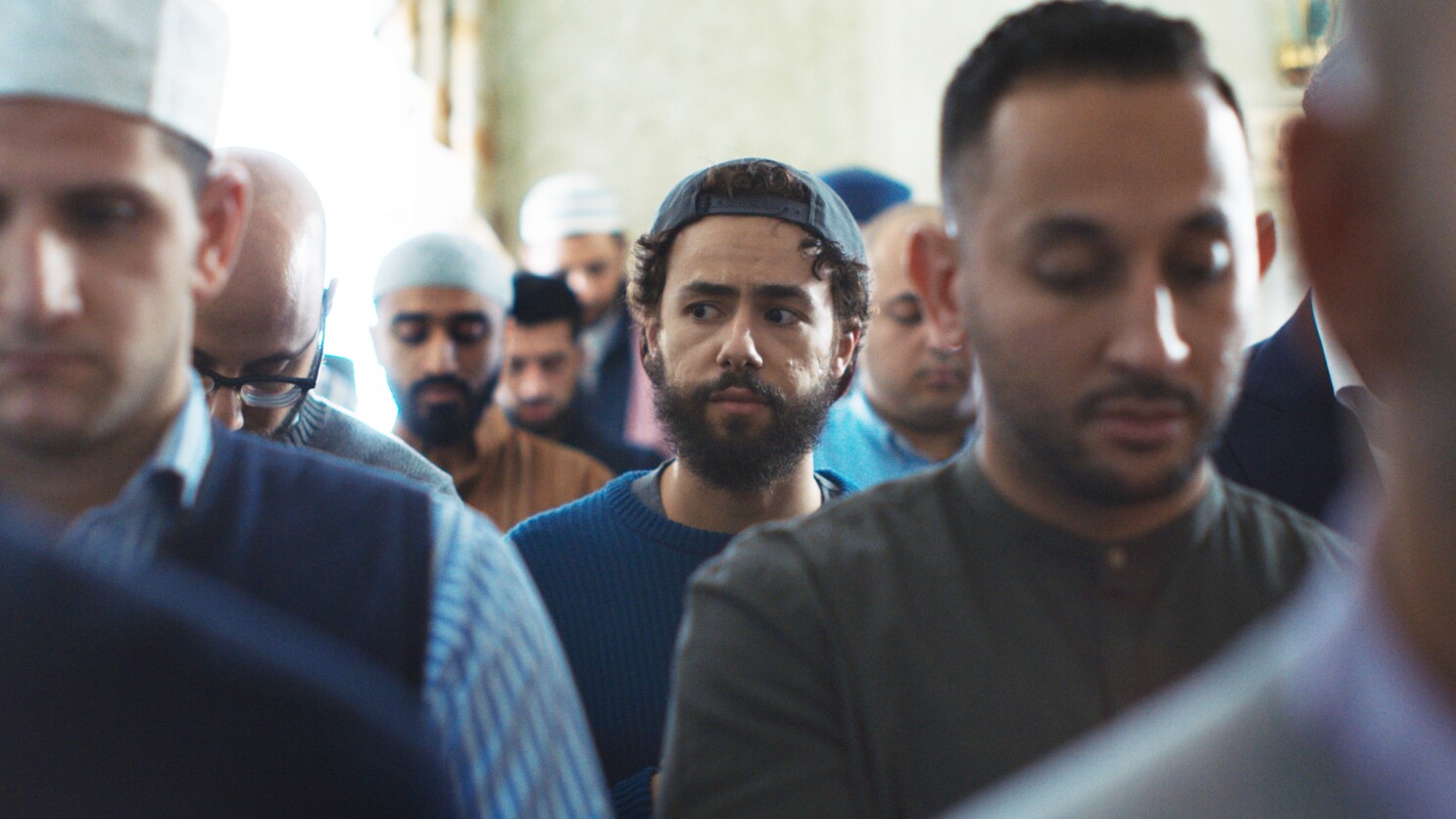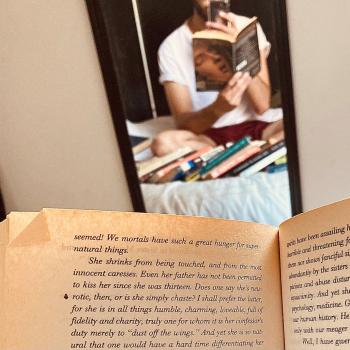Hulu’s Ramy is loosely based on the life of Ramy Youssef, who the show stars and was created by. Ramy is a first generation Egyptian-American growing up in a middle class New Jersey neighborhood. His parents, who are nominally Muslim, pamper their only son, who still lives at home as a young adult and is struggling to maintain a fulltime job. Though their expectations of him are lax, he knows that their one demand is that he settle down with a Muslim wife at some point and start a family.

Ramy finds himself caught between worlds. On one hand, he experiences American culture to be more lax morally, especially when it comes to sex, than his Muslim Egyptian culture. At his local masjid, his imam reprimands him for cutting corners in his observance of qur’anic teachings. He arrives to Friday jummah late, and rushes to wash his feet before entering to pray. He confides to the imam that he’s struggling with fornication, which he thought he could deter with pornography (which he’s now addicted to). The imam tells him that his caving to sexual vice is connected to his corner cutting. If he wants to stop falling into the devil’s pitfalls, he ought to pray, fast, and guard his gaze…and should probably start washing between his toes during ritual purification.
Between the morally permissive culture he’s surrounded by and the moralistic, legalist religiosity of his community, is the bourgeois assimilationist mentality of his parents. His parents don’t want him to go to the extremes of sexual libertinism, nor to religious fanaticism. All they seem to care about is that he get married “someday” and settle down to live a comfortable and respectable life.
As he tries to navigate the conflicting worldviews presented to him, he starts to hit a wall. None of them offer him any substantial meaning or a deeper purpose.
After one sexual encounter with a secular Jewish girl, he checks to see if there are any holes in his used condom. When she asks him what he’s doing, he tells her that he wants to make sure that she doesn’t get pregnant. As a Muslim, he wants to avoid having to abort a child, but also doesn’t want to have a child out of wedlock. “But I thought your were Muslim in the same way I’m Jewish…like it’s a cultural thing. Like, you drink alcohol.”
“Umm, actually I don’t,” he responds sheepishly. She reminds him that he ordered everyone drinks the night before, and he points out that he ordered drinks for everyone except himself. She leaves him, questioning the authenticity of his alleged religious convictions.
He then goes on a chaperoned date with a Muslim girl, who turns out to be kind and funny. After going for a walk without the chaperone (her uncle), she asks him to perform violent sex acts on her. Ramy is left confused, wondering why a deep conversation had to jump so quickly to sex. He points out that they’re both Muslim, and probably shouldn’t have sex before marriage. Though she’s surprised, she agrees and asks him to perform non-penetrative sexual acts on her. Ramy leaves, feeling empty and disillusioned.
He decides to fast, pray, and turn away from sex and pornography, and starts attending his masjid regularly. He agrees after prayer one evening to help one of the female congregants with taking care of her sick son while her husband is on a work trip, and ends up sleeping with her.
He then decides to go on a trip to Egypt to reconnect with his family, discover his roots, and go deeper in his faith. He begins a conversation with his grandfather, only for him to have a heart attack and die two minutes into it. Feeling even more spiritually lost than at the beginning of his trip, he agrees to accompany his female cousin to a Sufi prayer service.
Amazed by the beauty of the service and the tangible sense of the Divine, he shares with his cousin that he’s been struggling to finding meaning in his life. She tells him that she’s been on a similar journey, and found that Sufism helped her to draw closer to God. As they began to bear more of their souls with each other, they begin drawing closer physically, and end up kissing and eventually having sex.
Ramy returns from Egypt disgusted with his sinfulness and his inability to “fix” his life. He seeks out the help of a Sufi sheikh in his neighborhood and bares his soul to him, hoping that maybe this time things will be different.
I feel like I have this hole inside of me that’s – this, like, emptiness. And I’m always trying to fill it with something, like sex and porn. And I feel like the more people I’m with, the more alone I feel. And I’ve tried to fill it with God. I have. I won’t lie. But I just – I don’t know how. If I’m being honest, I started watching porn because I wanted to be a good Muslim. Like, I didn’t want to have sex before marriage, so I thought I could just watch porn to fill that urge. It just made me do crazier things.
The sheik, looks into his eyes silently, lovingly, and then proceeds to say, “I was once like you, too. Thankfully I was able to find someone who helped me reframe my desires, kill my ego.”
I want you to be my teacher, I want you to help me kill my desire.
How do I know I’m not just another one of your “desires”? It would be easy for you to hand me your pain and ask me to take it away. Be the solution to your problems, relieve you of having to deal with yourself. You seem to be driven by your own set of desire.
I don’t want to have desire. I don’t want to want anything. I just want God.
Through this dialogue, Ramy begins to recognize the connection between God and desire. The mystic tradition of Sufi Islam has a history of integrating desire with traditional Muslim ethics and worship. Ramy finds himself further attracted to this element of Sufism that neither the bourgeois, permissive, nor moralistic positions were able to offer him.
On a trip to request a donation from Mr. Bin Khalied, a wealthy Gulf investor, he happens upon adult film actress Mia Khalifa, whose porn he’s embarrassed to admit he’s watched. Bin Khalied admits the he also had a porn addiction, and came across a hadith that said that a man who drinks the breast milk of a woman other than his mother becomes her spiritual child. He reached out to Mia Khalifa and asked her to lactate for him, knowing that he wouldn’t be able to watch the porn of his “spiritual mother.” Eventually, he finds himself to be more interested in her personality and humanity as a whole than in using her as a tool to obtain sexual pleasure.
This reminds Ramy of something his sheikh said about recognizing the humanity of the women he uses sexually and learning to see them through the eyes of God.
The women you click on. Have you ever considered the plight of the performers, their pain, what they’re experiencing? I’ve heard they don’t even have beds, that they’re just driven around in white vans. What if you met a porn star, if you looked her in the eyes? Have you considered her feeling?
As he slowly progresses along his spiritual journey, he begins to see that it is indeed possible to have a relationship with a woman that’s not just about controlling or releasing his sexual urges. His new girlfriend (the sheik’s daughter) loves him for him, with his flaws and all, and is not interested in using him. Further, he expresses that she is becoming a sign of God to him. “I feel so much closer to God when I’m with you,” he tells her. Through this relationship, he realizes that his desire is fulfilled not by releasing or repressing it, but by channeling it into his journey toward God. He finds the kind of purity, intimacy, and honesty that he is experiencing with Zeinab to be refreshing and liberating, as it propels him further toward the Divine.
The one resounding message that emerges from Ramy is that if traditional religions are to have value in the postmodern world, they must facilitate the movement of our heart’s desire toward the Divine, rather than hindering it.












